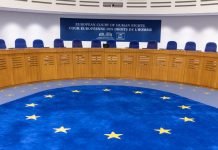The Grand Chamber of the European Court of Human Rights (ECtHR) convened on Wednesday to hear the case of Turkish teacher Yüksel Yalçınkaya, who was fired from his job by a decree-law and sentenced to more than six years in prison for membership in the Gülen movement following a coup attempt in 2016.
According to a report by Nordic Monitor, Saadet Yüksel, the judge representing Turkey on the court, asked a question in line with the Turkish government’s arguments about an encrypted messaging application that the Supreme Court of Appeals ruled did not constitute sufficient evidence of a crime. Human rights defenders and lawyers have described this as a scandal, demanding that Yüksel withdraw from the case.
The Turkish government accuses the Gülen movement of orchestrating the controversial coup attempt on July 15, 2016. The movement, however, strongly denies any involvement.
The government accepted such activities as having an account at the Gülen-affiliated Bank Asya, holding an administrative position at a Gülen movement-linked institution, subscribing to the group’s publications, being a member of a trade union or other institution linked to the Gülen movement and using the encrypted messaging application ByLock as benchmarks for identifying and arresting tens of thousands of followers of the Gülen movement on charges of membership in a “terrorist” organization.
Yalçınkaya, who was accused of using ByLock, having an account at Bank Asya and membership in a movement-affiliated union, filed an individual application at the Constitutional Court after his conviction was upheld by the Supreme Court of Appeals. The country’s top court ruled against him, upon which Yalçınkaya applied to the ECtHR in 2020. In his application he argued that the decisions rendered by the Turkish courts were contrary to the articles of the European Convention on Human Rights on “fair trial,” “no punishment without law,” “respect for private life” and “freedom of association.”
At the hearing Yalçınkaya’s lawyers explained how the ByLock data was was obtained illegally and could not be used as evidence. Stating that ByLock was an application that was available to everyone, lawyers said it was downloaded by approximately 600,000 people all around the world. “The ByLock data was obtained by the National Intelligence Organization [MIT] without a warrant, and the plaintiff’s requests to show him the data or for it to be examined by an expert were denied,” his lawyers told the judges.
They also said the raw ByLock data was not given to the courts during Yalçınkaya’s trials, that it was processed by MIT and that therefore the integrity of the data was damaged so could not be considered legal evidence.














